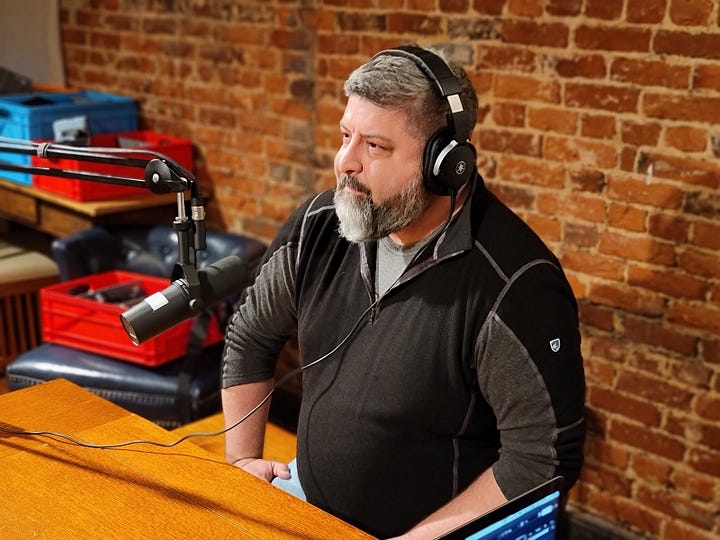Tuesday May 16, 2023
IN THIS ISSUE: New Dominion Podcast | Baseless Race | What's Happened to Editorials?
PODCAST: Fredericksburg’s art vibe, “Are the medium, not the genre,” humanitarian aid, and building community
The co-owners of Curitiba in the heart of downtown Fredericksburg join Shaun and I to talk about the art scene in Fredericksburg, Main Street, and the challenges the city faces. We also go deep into Megan’s experiences in Haiti offering humanitarian aid. If you know Cori and Megan, you’ll value their thoughts; if you don’t, these are two young leaders you’ll want to spend time with.


GUEST COMMENTARY: Like It or Not, Race is - in a Word - ‘Bunk’
by David S. Kerr
People put a lot of stock in what race they and others belong to. Race is a way we have sorted out humanity since our earliest beginnings as a society. Often, with the goal of subjugating one race to another. It has been the basis of unspeakable crimes and depredations. Indeed, it’s at the core of much of our politics in 21st century America. However, what if there wasn’t such a thing as race? What if, after putting aside the cultural differences and the minor physical differences, we were all the same?
Well then, here is some news, and it’s been well known for almost two decades. We are all the same.
Twenty years ago, last month, the U.S. Government published the results of the first phase of the human genome study. It was a dramatic scientific leap forward. And the work continues. However, it offered one conclusion of note. We humans, our DNA and genetic makeup are 99.9% the same. Of course, an individual can be classified in a racial grouping, but that’s all it is, it is a grouping based on culture and superficial physical appearance.
Or, as Robert Sussman in Newsweek put it, “The notion of race may be real, but the science is not. We are all the same, with no exceptions.”
Of all the creatures on Earth modern humans, homo sapiens, are amongst the least differentiated creatures on the planet. Unlike birds, felines, dogs, amphibians or fish, there is only one model. That doesn’t mean we don’t have differences in skin color, bone structures, or that there aren’t inherited differences that dominate certain groups of people. But if you take one human from anywhere on the planet and compare their genetic makeup to another, they are almost the same. In a sense, we’re decidedly boring.
However, let’s keep this train of thought going. Not only are our differences insignificant, but like it or not, we’re also all related to one another. The great human migration, the one that would eventually be dominated exclusively by homo sapiens, began about 200,000 years ago in southern Africa. That’s where a small population of homo sapiens (modern humans) started making their way north.
So, here is what’s going to bother some people, or maybe it won’t, and that’s that we really are related to one another. That small group didn’t grow into “us” without mixing it up a lot. We are all related. Not just in the sense of being one happy planet, or the family of humankind, but in the fact, that your African American neighbor, the Chinese commentator you listened to last night, or the Jewish man you work with, as well as your uncle Fred, and some Peruvian sheep farmer in the Andes, are all related to you. Oh, sure, the lineage is nearly impossible to trace, we are talking about antiquity here, but we’re all related. That’s a given.
Sadly, racism and prejudice seem to be a state of mind that we humans are surprisingly comfortable with. The thing is the conclusions of the human genome project, and this is established science, all but destroys the whole foundation of that kind of thinking. If 99.9% of the genetic material that makes up the 20,000 genes that can be mixed and matched into up to 3 billion base pairs that make us humans are the same, then science has proven we have a lot more in common than we ever imagined. In fact, we have everything in common.
So, the conclusion is that racism, a scourge of our society for millenia, including the very business of classifying people into races (which as people mix more and more is getting harder to do), and then talking about “them and us,” is flawed to begin with. So, maybe we’d be wise to remember that there is no us and them.
Or, at least scientifically, there shouldn’t be.
David Kerr has spent much of his career on Capitol Hill, and is a prominent fixture in Virginia politics. He’s an adjunct professor of political science at Virginia Commonwealth University.
COMMENTARY: What’s Happened to Editorials?
by: Martin Davis
Dwayne Yancey is a legend in Virginia journalistic circles. And he may well have the best understanding of just how much trouble local journalism is in here in the state. Especially the local editorial page.
In his Monday piece for Cardinal News - the publication he founded and edits - Yancey explores the collapse of editorial pages in the state, and the negative impact it’s having on citizens.
As Yancey notes, the problem is potentially greater than the obvious ones.
“Sometimes,” he writes, “… big trends are too big for us to fully comprehend.”
To see those details, read the full story.
I’ll have much more to say about this in coming weeks. So, stay tuned….

If it weren’t race, humans would find another characteristic to make them feel superior to others of our species.